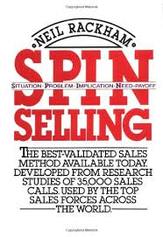 Based on Noah Kagan's recommendation on his interview with Tim Ferriss, I just finished reading SPIN Selling by Neil Rackham, and I really liked it. I was afraid it would be a cliche-filled business book, and I was pleasantly surprised by the thoughtfulness and scientific approach of the authors. It's now pretty clear to me why this is a classic and the #1 best-selling business sales book on Amazon. I don't think there's any rocket science it preaches. What it does get right is that the SPIN questioning process makes the buyer get down to the nitty gritty details and actually understand the problems he or she is facing. It's like the classic problem of software estimation, where only sitting your butt down and figuring out what you have to do and counting all the little details will give you any remotely accurate estimate (I'm concurrently reading Software Estimation: Demystifying the Black Art by Steve McConnell as part of our eng reading group). I like that the book puts the focus on how to interview and ask questions instead of how to present and "market" features. This focus on interviewing and gaining empathy reminds me a lot about d-school/design thinking processes and lean startup methodologies for entrepreneurs seeking to "sell" (= learn). I also liked how the authors tried hard to disprove their own theories, including running multiple studies to check for the strength of the Hawthorne effect on their subjects. They had a entire long appendix devoted to the control and statistics methodologies they used. SPIN = Situation, problem, implication, need payoff Preface Larger sales techniques Based on research of 35K sales calls 1 sales behavior and sales success Closing, probing open questions, and objection handling are not the key skills Longer time frame Ongoing relationship Seller not present when buyer deciding Multiple calls needed 4 steps Preliminaries Investigating Demonstrating capability Obtaining commitment No relationship between open questions and sales success Good investigating questions follow 4 step spin model Situation questions: tell me about your company's growth plans Problem questions: is this operation difficult to perform Implication questions: how will this problem affect your future profitability (help understand a problem's effects and urgency) Need payoff questions: would it be useful to speed this up 10%? How would that help u? 2 obtaining commitment: closing the sale Classic closing techniques ineffective Association between closing and lost sales Closing techniques work for low value products Closing success for large sales not only just an order Judge success by customer actions not words 3 Implied needs vs explicit needs Less successful salespeople don't separate implied and explicit needs Implied needs not success signal in larger sales Value equation: comparison between cost of solution and seriousness of problem Larger sales need explicit needs uncovered Can't just rely on problems; need to grow them to something actionable Purpose of questions is to uncover needs and convert implied to explicit 4 the spin strategy Situation questions not positively related to success Use them with purpose Problem questions more useful Are you satisfied with your current solution for x? Doesn't it mean you lose out with y? Linked to sales success Implication questions: you say x is hard to use. What effect does this have on your output? Could that lead to increased costs? Keep growing understanding of problem by adding up costs that weren't perceived before Need payoff question: positive solution based questions. How would that help? What benefits would you see if you got x? How do you think a faster machine would help you? Get customer to explain to u how ur product solved their problem Make customer the expert Rehearse the customer for internal selling Have buyers explain the benefits to the seller Implication questions are about the problem (sad) Need payoff questions are about the solution (happy) Write down list of 3 potential client problem areas before the call Think of related difficulties of those problems (implications) Don't ask need payoff question when u can't meet that need Need payoff examples: why would that help? Would it help if? Why is that important? How would that help? Would it be useful if? Is there any other way this could help u? 5 giving benefits in major sales Demonstrating capability Features and benefits Features unpersuasive Benefits better, can only address explicit needs Advantages just show how it meet any need Benefits tied to sales success but only when needs made explicit Don't neglect needs in favor of features of new product Turn attention from product to customer Don't demonstrate capabilities too early in the call Beware of advantage statements Be careful with new products 6 preventing rejections Objection handling less important skill Better to prevent objections Listing features makes buyers want less for expensive goods Features increase price concern Link between advantages and objections Don't talk about solutions until gotten enough info on needs 7 preliminaries First impressions less critical Durable impressions made during investigating stage Don't always begin with connecting about personal interests Early in call u want to establish ur role as the seeker of info and buyer as the giver so u can ask questions instead of talking about solutions Get down to business quickly instead of pleasantries Don't talk about solutions too soon Concentrate on questions 8 turning theory into practice Ppl work harder to learn knowledge instead of skills Practice only one behavior at a time Try the new behavior 3 times Quantity instead of quality Practice in safe situations Focus on investigating stage and asking questions Implications of problems: increased costs, demotivates best people, causes inefficiencies, answers to so what
0 Comments
Your comment will be posted after it is approved.
Leave a Reply. |
Archives
June 2024
Categories
All
Subscribe |
 RSS Feed
RSS Feed
